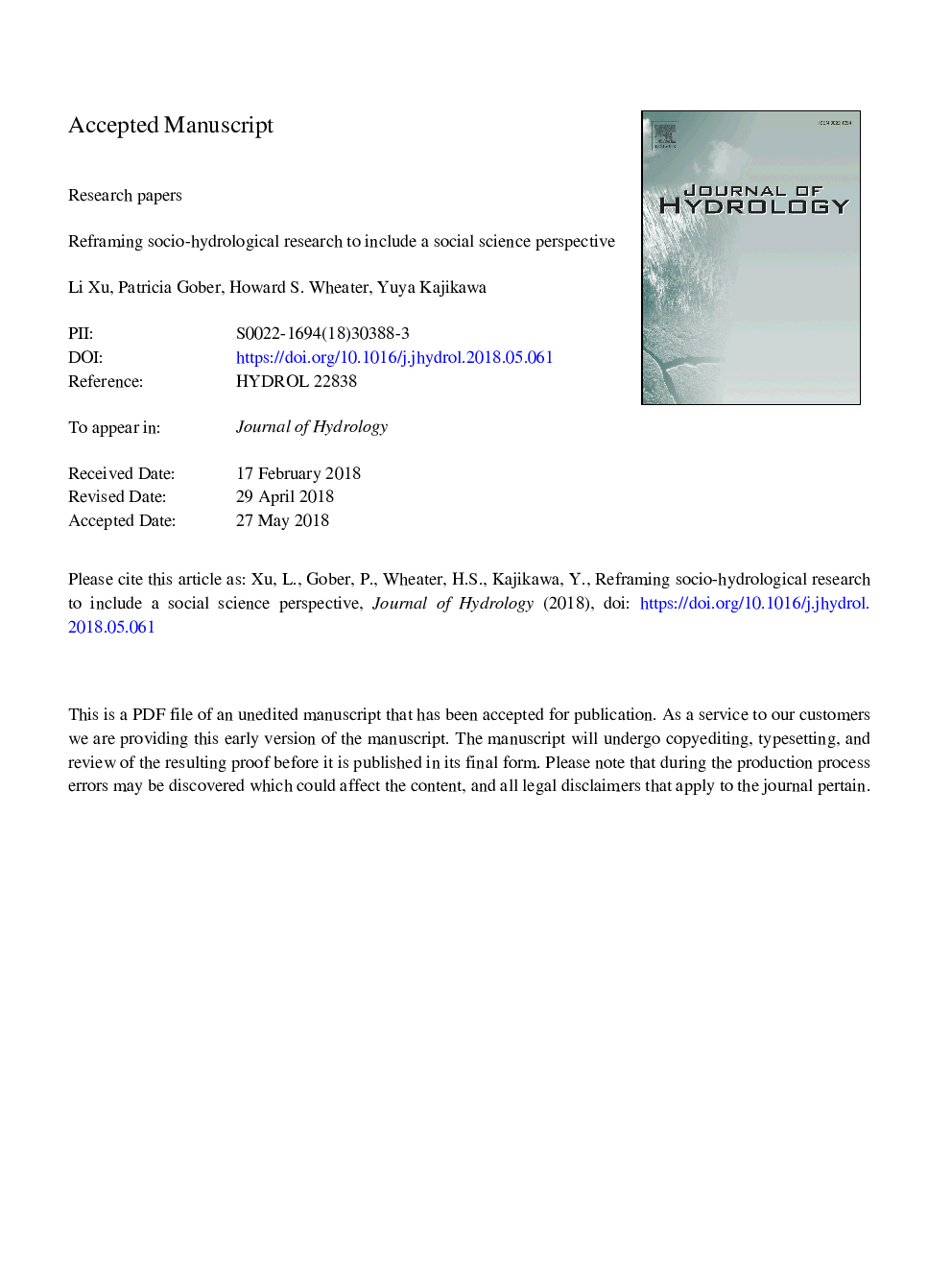| کد مقاله | کد نشریه | سال انتشار | مقاله انگلیسی | نسخه تمام متن |
|---|---|---|---|---|
| 8894552 | 1629891 | 2018 | 35 صفحه PDF | دانلود رایگان |
عنوان انگلیسی مقاله ISI
Reframing socio-hydrological research to include a social science perspective
ترجمه فارسی عنوان
بازنگری پژوهش اجتماعی-هیدرولوژیکی شامل یک چشم انداز علوم اجتماعی
دانلود مقاله + سفارش ترجمه
دانلود مقاله ISI انگلیسی
رایگان برای ایرانیان
کلمات کلیدی
تعامل انسان و آب، دینامیک سیستم، معیارهای کتابشناسی تجزیه و تحلیل شبکه، بین رشته ای،
ترجمه چکیده
شناخت فزاینده نیاز به ترکیب تعاملات پیچیده و پویا بین جامعه و آب در مطالعات سیستم های منابع آب وجود دارد. مطالعه دینامیک انسان آب نیاز به مشارکت محققان از رشته های مختلف از جمله هیدرولوژی و علوم اجتماعی دارد. در این مقاله، روند جدیدی در تحقیقات اجتماعی هیدرولوژیکی با استفاده از روش های کمی و کیفی دنبال می شود. معیارهای کتابشناختی و تجزیه و تحلیل شبکه برای شناسایی رویه های عمومی و نشان دادن ارتباطات داخلی در این زمینه کوچک اما در حال رشد بین رشته ای استفاده می شود. نتایج نشان می دهد که هیدرولوژیست ها در مطالعات اجتماعی هیدرولوژی در حال حاضر تعریف شده اند، با مشارکت کمتر از دانشمندان علوم اجتماعی. سوالات تحقیقاتی برای اجتماعی هیدرولوژی تمایل به تمرکز بر پویایی سیستم دارند و اغلب به گونه ای طراحی نشده اند که منافع و تخصص دانشمندان علوم اجتماعی را دربر گیرد. تجزیه و تحلیل کیفی موانع کلیدی در توسعه بین رشته ای از هیدرولوژی اجتماعی و شناسایی نیازهای تحقیق و مسیرها برای ادغام بهتر ابعاد انسانی علوم آب را مطرح می کند. جذب دانشمندان علوم اجتماعی به این حوزه نیاز به مفهومی وسیعتر از جامعه شناسی اجتماعی دارد تا تمرکز بر توسعه پایدار، ارزیابی ریسک، مدیریت خطر، انعطاف پذیری، انطباق و بسیج دانش در کنار تمرکز سنتی هیدرولوژی بر مدل سازی سیستم و حمایت از تصمیم گیری باشد. ما سه موضوع را برای تمرکز موضوعی پیشنهاد می کنیم: ریسک سیستماتیک و خطرات طبیعی؛ علم پایداری؛ و تطبیقی حکومت این فرایند گسترده اجتماعی هیدرولوژی ذاتا بیشتر بین رشته ای است، روش ها و دیدگاه های جدیدی را در زمینه به ارمغان می آورد و تضمین می کند که ارزش های محلی مبتنی بر مکانی در مطالعات دینامیک سیستم آب گنجانده شود.
موضوعات مرتبط
مهندسی و علوم پایه
علوم زمین و سیارات
فرآیندهای سطح زمین
چکیده انگلیسی
There is increasing recognition of the need to incorporate the complex and dynamic interactions between society and water in studies of water resource systems. The study of human-water dynamics requires the involvement of researchers from different disciplines, including hydrology and social science. This paper tracks recent trends in socio-hydrological research using quantitative and qualitative methods. Bibliographic metrics and network analysis are used to identify general trends and illustrate the internal connections in this small but growing interdisciplinary field. Results show that hydrologists dominate research in socio-hydrology as presently defined, with far less participation from social scientists. Research questions for socio-hydrology tend to focus on system dynamics and are often not framed in a way that engages the interests and expertise of social scientists. A qualitative analysis addresses key barriers to the interdisciplinary development of socio-hydrology and identifies research needs and directions for better integration of the human dimensions of water science. Attracting social scientists to this field requires a broader conceptualization of socio-hydrology to focus on sustainable development, risk assessment, hazard management, resilience, adaptation, and knowledge mobilization in addition to hydrology's traditional focus on systems modeling and decision support. We propose three themes for thematic focus: systemic risk and natural hazards; sustainability science; and adaptive governance. This broader framing of socio-hydrology is inherently more interdisciplinary, brings new methods and viewpoints to the field, and ensures that place-based local values are included in studies of water system dynamics.
ناشر
Database: Elsevier - ScienceDirect (ساینس دایرکت)
Journal: Journal of Hydrology - Volume 563, August 2018, Pages 76-83
Journal: Journal of Hydrology - Volume 563, August 2018, Pages 76-83
نویسندگان
Li Xu, Patricia Gober, Howard S. Wheater, Yuya Kajikawa,
